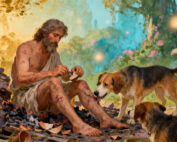By Chaplain (Col) Stephen W. Leonard, USA, Ret.
“This, the first of his signs, Jesus did at Cana in Galilee, and manifested his glory. And his disciples believed in him.” John 2:11
Why John alone tells this historic story, which takes place at the beginning of Jesus’ public ministry, is at first a mystery to us. No other Gospel writer did! John, however, unlike the Synoptic Gospels, Matthew, Mark, and Luke, is the Gospel writer who writes unique material. He includes such material in his Gospel, which was written at the end of the first century, three decades after the others were actually written.
The Apostle John was deeply influenced in writing the Gospel of John by the vision he had on the Isle of Patmos in 95 AD: a vision of heaven, of the last days; the seven years of tribulation, of Jesus’ return, and of Jesus Himself in his glorified state. This accounts for John writing “a spiritual Gospel.”
He recounted what he had lived from the perspective of this vision, as one of His twelve disciples in Jesus’ public ministry. He now saw Jesus and His deeds through the prism of the glorious vision, more so than a mere dream, a vision true to what was, is, and will be.
John recognized Jesus as THE Bridegroom, after witnessing the magnificent Marriage Feast of the Lamb in Revelation 20. From such a picture of the future, he saw Jesus manifesting His glory at this wedding in Cana as a spiritual, and real Bridegroom. There, Jesus performed His first miracle, providing out of water an abundance of fine wine, something for which a bridegroom on that day was responsible.
John was a guest at this wedding with Jesus and the other disciples. When the wine ran out unexpectedly early in the celebration, Mary, Jesus’ mother, asked her Son to do something about it. He ended up obeying her request, even though He did not want to reveal Himself too early in His ministry and draw the attention of the authorities. But what Jesus did here fulfilled the actual bridegroom’s requirement as any wedding on that day, though it was fully unknown to the guests. They thought the bridegroom, whose wedding it was, supplied all the wine.
It really was his responsibility to provide wine for his own wedding feast. When it ran out, this problem would reflect adversely on him, his bride, and his family. Jesus came to his aide quietly by providing an overabundance of wine to fill the need; wine which, according to the Master of the Feast, was a finer wine by far than had been served earlier.
The guests believed the bridegroom of the wedding provided this excellent wine. This was seen in the fact the Master of the Feast, who tasted it before all the others, thought the bridegroom actually supplied it for his guests. He did not know that Jesus’ miracle truly produced it.
The bridegroom’s reputation thus went unfazed. In fact, it greatly increased, which was one of Jesus’ desires. Jesus stands behind every bridegroom to supply in their marriage what is missing, if only we would avail ourselves of His help. Alas, we too much ignore Him and all He can give to our marriages in His benevolent mercy.
The glory Jesus manifested on this occasion was more than His supernatural power to change water into wine. You must understand that your own “glory” is reflected in who you truly are in and by God’s marvelous grace.
Jesus here manifested His own glory, that He is our Bridegroom. This is who He is. And his marriage to us will be finally accomplished at the marriage feast of the Lamb. Jesus’ glory is that He is the Bridegroom of every believer, all those in His invisible church. It is His glory to be wedded to you for eternity! There is no greater glory for us, and it is His own magnificent glory to be that to you!
Encouragement
Stay Updated
Sign up for our monthly newsletter and weekly devotional











